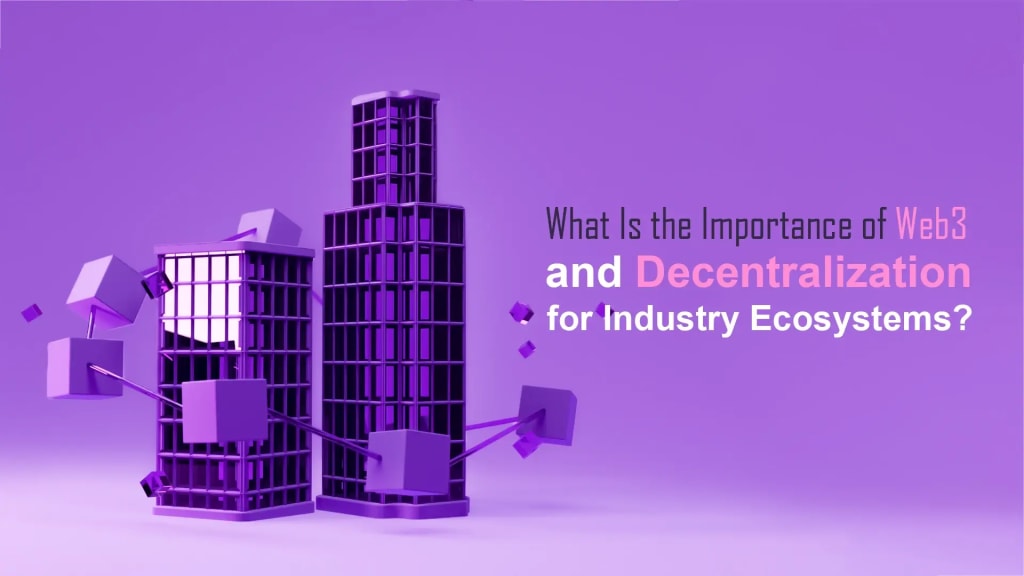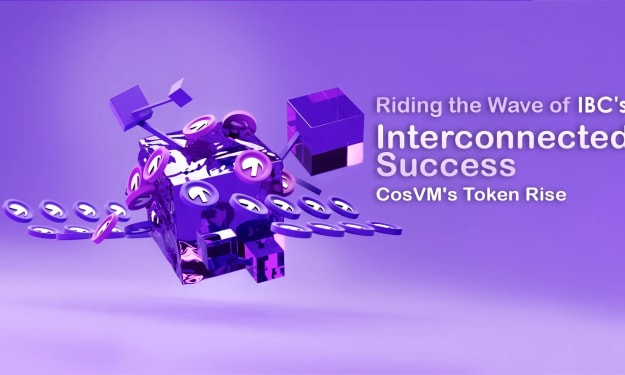What Is the Importance of Web3 and Decentralization for Industry Ecosystems?
What Is the Importance of Web3 and Decentralization

"Web3" is a term that may carry differing interpretations, and for clarity, we will specify what it means. Web3 signifies the upcoming phase of the internet, characterized by the development of decentralized applications (dApps) on various blockchains. Their fundamental design sets Web3 applications apart from their traditional counterparts—operating independently without dependence on a central authority. Instead, these dApps depend on the inherent security provided by the blockchain on which they are deployed.
Decentralization is essential to maintaining the security, dependability, and resilience of the Web3 network. However, with its increasing popularity, its supporting infrastructure remains highly centralized. Achieving decentralization increases system complexity and is difficult work.
In this blog, we explore the importance of decentralized infrastructure in Web3 and the reasons for its continued centralization across multiple industries. We will discuss how the ecosystem could be impacted by centralization in the Web3 infrastructure and how we are working on fixing this issue.
Why Is Decentralization So Important?
Decentralization is crucial for several reasons, influencing various aspects of technology, governance, and societal structures. Here are some key reasons why decentralization is considered important:
Reduced Single Points of Failure:
In centralized systems, a single point of failure, such as a central server or authority, can lead to catastrophic failures. Decentralization distributes functions and data across a network, reducing the impact of any individual failure.
Enhanced Security:
Decentralized systems often leverage cryptographic techniques and consensus algorithms inherent in blockchain technology. This results in heightened security, as altering information in a decentralized network requires an impractical amount of computational power and consensus.
Resilience to Attacks:
Decentralized networks are more resistant to malicious attacks. The absence of a central target makes it challenging for hackers to compromise the entire system.
Increased Privacy:
Decentralization supports greater privacy by reducing the need for intermediaries that collect and control large amounts of personal data. Users have more control over their information and can choose how and when to share it.
Empowerment of Individuals:
Decentralization shifts power from centralized authorities to individuals. Users have more control over their assets, data, and digital interactions. This empowerment fosters a sense of autonomy and ownership.
Boosting Innovation:
Decentralized systems often operate on open-source principles, encouraging collaboration and innovation. This openness allows developers to build on existing technologies, creating a more dynamic and rapidly evolving ecosystem.
Promoting Financial Inclusion:
In finance, decentralization, especially through technologies like decentralized finance (DeFi), provides financial services to a broader population. People who are unbanked or underbanked can access financial tools without relying on traditional institutions.
Transparency and Trust:
Decentralized ledgers, often implemented through blockchain technology, offer transparency and immutability. A network fosters trust and accountability by providing access to all information.
Censorship Resistance:
Decentralized systems are less susceptible to censorship, as there is no central authority that can control or restrict access to information. This is particularly important in regions where freedom of expression is limited.
Environmental Sustainability:
Certain decentralized technologies, such as proof-of-stake consensus mechanisms, are more energy-efficient than traditional proof-of-work systems. This aligns with the growing concern for environmentally sustainable practices in the digital space.
The Challenge of Decentralization in Web3 Infrastructure
Achieving full decentralization in the Web3 infrastructure presents multifaceted challenges as the paradigm gains popularity and complexity:
Popularity and Complexity: The surging demand for decentralized applications strains the infrastructure, amplifying the inherent complexity of achieving decentralization at scale.
Technical Hurdles: Implementing distributed systems, consensus algorithms, and secure cryptographic practices demands sophisticated engineering solutions and ongoing innovation.
User Adoption and Education: Bridging the gap between centralized familiarity and decentralized adoption requires robust educational efforts and user-friendly interfaces.
Interoperability Concerns: Ensuring seamless communication and compatibility among blockchains poses a challenge to creating a unified, fully decentralized Web3 landscape.
Regulatory Landscape: Navigating regulatory uncertainties is crucial to strike a balance between innovation and compliance for decentralized systems.
Scalability Pressures: Managing increased user and transaction demands without compromising decentralization poses a delicate challenge.
Incentive Mechanisms: Designing effective incentives for participant contributions is critical for the sustainability and growth of decentralized ecosystems.
Community Governance: Establishing inclusive and efficient governance structures is an ongoing challenge as decentralized systems rely on active community participation.
Choose the Best Blockchain Ecosystems for Your dApp
Cosmos Virtual Machine (CosVM) is a combination of Cosmos and EVM and offers a complete solution to address key considerations in the quest for the ideal blockchain ecosystem for deploying decentralized applications (dApps). CosVM, as part of the Cosmos blockchain, provides a robust environment for developers seeking a decentralized and interoperable platform.
One notable advantage lies in its exceptional interoperability, which enables seamless communication between different blockchains. This facilitates the creation of dApps that can interact efficiently with various decentralized networks.
CosVM prioritizes scalability, ensuring that as the demand for dApps grows, the ecosystem remains responsive and efficient. Its commitment to security, leveraging the inherent strengths of the Cosmos blockchain, adds a layer of trust for developers deploying smart contracts.
CosVM promotes a user-friendly development environment, making it accessible for a diverse range of developers to contribute to the decentralized ecosystem.
As the importance of choosing the right blockchain ecosystem becomes paramount for dApp developers, CosVM stands out as a compelling choice that combines technical prowess with user-centric features.
Conclusion
Web3 and decentralization are important for industry ecosystems, managing crucial issues in centralized systems and promoting security, resilience, and innovation. Despite challenges in achieving full decentralization, CosVM succeeds as an exciting solution with exceptional interoperability, scalability, and a user-friendly development environment. As we navigate the complexities of decentralization, CosVM plays an important role in shaping the decentralized ecosystem's future. Contact us to discover how CosVM can meet your development needs and contribute to a decentralized Web3. Let's shape the future of decentralized technologies with us.





Comments
There are no comments for this story
Be the first to respond and start the conversation.